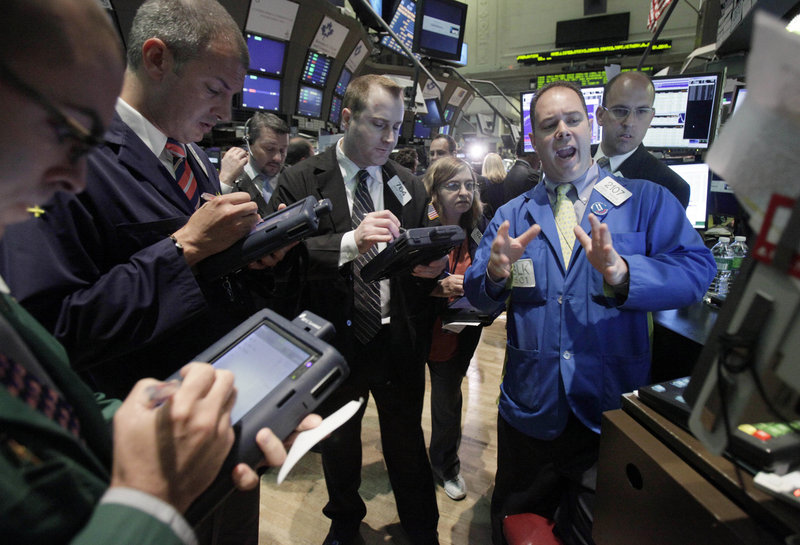NEW ORLEANS – BP’s stock plummeted and took much of the market down with it Tuesday as the federal government announced criminal and civil investigations into the Gulf of Mexico oil spill.
Attorney General Eric Holder, who was visiting the Gulf to survey the fragile coastline and meet with state and federal prosecutors, would not specify the companies or individuals that might be targeted in the investigations into the largest oil spill in U.S. history.
“We will closely examine the actions of those involved in the spill. If we find evidence of illegal behavior, we will be extremely forceful in our response,” Holder said in New Orleans.
BP’s stock nose-dived Tuesday, losing nearly 15 percent of its value on the first trading day since the previous best option to stop the oil leak — the so-called “top kill” — failed and was aborted at the government’s direction. It dipped steeply with Holder’s late-afternoon announcement, which also sent other energy stocks tumbling, ultimately causing the Dow Jones industrial average to tumble 112 points.
After six weeks of failures to plug the leak or divert the oil, BP was using robotic machines to carve into the twisted appendages of the crippled well. The latest attempt involved using tools resembling an oversized deli slicer and garden shears to break away the broken riser pipe so engineers can then position a cap over the well’s opening.
Even if it succeeds, it will temporarily increase the flow of an already massive leak by 20 percent – at least 100,000 gallons more a day. And it is far from certain that BP will be able to cap a well that one expert compared to an out-of-control fire hydrant.
“It is an engineer’s nightmare,” said Ed Overton, a Louisiana State University professor of environmental sciences. “They’re trying to fit a 21-inch cap over a 20-inch pipe a mile away. That’s just horrendously hard to do. It’s not like you and I standing on the ground pushing — they’re using little robots to do this.”
The operation has never been performed in such deep water, and is similar to an earlier failed attempt that used a larger cap and quickly froze up. BP officials said they were applying lessons learned from the earlier effort.
“If all goes as planned, within about 24 hours we could have this contained, but we can’t guarantee success,” said BP’s Doug Suttles.
Since the Deepwater Horizon rig exploded on April 20, killing 11 workers and eventually collapsing into the Gulf of Mexico, an estimated 20 million to 40 million gallons of oil has spewed, eclipsing the 11 million that leaked from the Exxon Valdez disaster.
President Obama, meanwhile, ordered the co-chairmen of an independent commission investigating the spill to thoroughly examine the disaster, “to follow the facts wherever they lead, without fear or favor.”
The commission — led by Bob Graham, a former Florida governor and U.S. senator, and William K. Reilly, a former head of the Environmental Protection Agency — will be examining the disaster and its causes. The president said that if laws are insufficient, they’ll be changed. He said that if government oversight wasn’t tough enough, that will change, too.
Holder said the laws under review for the criminal and civil probes include the Clean Water Act, the Oil Pollution Act of 1990, the Migratory Bird Treaty Act and the Endangered Species Act. He said the government would pursue criminal charges “if warranted,” a caveat he did not include for civil action.
“We will ensure that every cent of taxpayer money will be repaid and that damage to the environment and wildlife will be reimbursed,” he said.
Washington lawyer Stan Brand said that two likely criminal law theories the Justice Department will pursue are false statements to the Interior Department’s Mineral Management Service and obstruction by failing to produce evidence to investigators.
But Brand and longtime Washington lawyer Stephen Ryan, a former federal prosecutor and ex-congressional investigator, predicted it will be difficult to prove criminality.
“Bad business judgment isn’t a crime,” Ryan said.
Criminal charges met with mixed results in a previous high-profile U.S. oil spill. Joseph Hazelwood, captain of the Exxon Valdez supertanker that ran aground off Alaska’s coast in 1989, was acquitted of being drunk when the accident occurred, but convicted of a misdemeanor for negligent oil discharge. He was fined $50,000 and ordered to perform 1,000 hours of community service.
Send questions/comments to the editors.



Success. Please wait for the page to reload. If the page does not reload within 5 seconds, please refresh the page.
Enter your email and password to access comments.
Hi, to comment on stories you must . This profile is in addition to your subscription and website login.
Already have a commenting profile? .
Invalid username/password.
Please check your email to confirm and complete your registration.
Only subscribers are eligible to post comments. Please subscribe or login first for digital access. Here’s why.
Use the form below to reset your password. When you've submitted your account email, we will send an email with a reset code.